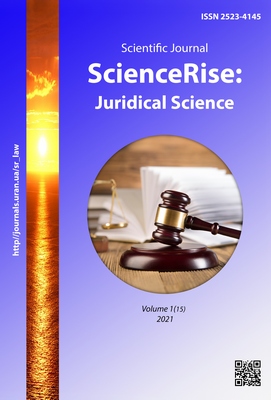Legal regulation of the license agreement
DOI:
https://doi.org/10.15587/2523-4153.2021.227133Keywords:
license agreement, license, intellectual property rights, licensor, licensee, agreement on the transfer of exclusive intellectual property rights, disposal of intellectual property rightsAbstract
The legal regulation of the license agreement is considered. Its contractual construction is investigated. The norms of the Civil Code of Ukraine and other normative legal acts on determining the essential terms of the license agreement are analyzed and it is clarified, which conditions must be agreed by the parties in order for the license agreement to be considered concluded. The scientific analysis of the legal nature of the license agreement in the system of civil law agreements is carried out. The objective essential conditions and features of concluding a license agreement are revealed. The subject and terms of the contract are considered. The rights and responsibilities of the licensor and the licensee are analyzed. The advantages of each party of the contract are determined. The civil law aspects of regulation of contractual license relations are investigated. The legal nature of the license is determined. The classification of license agreements has been carried out. The analysis of the current legislation in the field of granting property rights to the results of intellectual activity is carried out. The essential conditions of the agreement on creation on the order and use of the object of intellectual property rights and the agreement on transfer of exclusive property rights of intellectual property are investigated. The relationship between the license and the license agreement has been clarified. Recommendations on the structure of license agreements and advice on their content and method of presentation are provided. Conclusions and proposals, aimed at improving civil legislation in the field of legal regulation of license agreements, are formulated. It is concluded, that the license agreement is a fair mechanism for obtaining remuneration for the creation or acquisition of intellectual property
References
- Chorna, Z. L. (2017). To the Question of Essential Conditions of the License Contract. University scientific notes, 63, 106–116. Available at: http://www.univer.km.ua/visnyk/1649.pdf
- Kodynets, A. (2015). Problemy normatyvnoho rehuliuvannia litsenziinoho dohovoru. Pidpryiemnytstvo, hospodarstvo i pravo, 1 (229), 22–26. Available at: http://www.pgp-journal.kiev.ua/archive/2015/01_2015.pdf#page=22
- Bieltiukova, I. M. (2019). Legal regulation of the continuity of property rights of intellectual property under the civil legislation of Ukraine. Odessa, 19. Available at: http://dspace.onua.edu.ua/handle/11300/11725
- Guadamuz, A. (2009). The License/Contract Dichotomy in Open Licenses: A Comparative Analysis. Available at: https://www.researchgate.net/publication/228172637_The_LicenseContract_Dichotomy_in_Open_Licenses_A_Comparative_Analysis
- Anubhav, P. (2018). IP Licensing Agreements – The First in The Series of 5 Important IP Contracts. Available at: https://blog.ipleaders.in/ip-licensing-agreements/
- Cameron, D. M., Borenstein, R. (2003). Key Aspects of IP License Agreements. Available at: http://www.jurisdiction.com/lic101.pdf
- Newman, C. M. (2012–2013). A License Is Not a Contract Not to Sue: Disentangling Property and Contract in the Law of Copyright Licenses. Available at: https://heinonline.org/HOL/LandingPage?handle=hein.journals/ilr98&div=31&id=&page=
- Newman, C. M. (2013–2014). An Exclusive License Is Not an Assignment: Disentangling Divisibility and Transferability of Ownership in Copyright. Available at: https://heinonline.org/HOL/LandingPage?handle=hein.journals/louilr74&div=5&id=&page=
- Patterson, M. R. (2012–2013). Must Licenses Be Contracts – Consent and Notice in Intellectual Property. Available at: https://heinonline.org/HOL/LandingPage?handle=hein.journals/flsulr40&div=6&id=&page=
- Ard, B. J. (2015). Notice and Remedies in Copyright Licensing. Missouri Law Review, 80 (2). Available at: https://heinonline.org/HOL/LandingPage?handle=hein.journals/molr80&div=15&id=&page=
- Tsyvilnyi kodeks Ukrainy (2003). Zakon Ukrainy No. 435-IV. 16.01.2003. Vidomosti Verkhovnoi Rady Ukrainy, 40-44, 356.
- Asadchev, Iu. I. Osobennosti pravovogo regulirovaniia zakliucheniia i gosudarstvennoi registratsii litsenzionnykh dogovorov. Otdelnye aspekty nalogooblozheniia litsenzionnykh dogovorov. Available at: http://lexliga.com/novosti/liczenzionnyix-dogovorov
- V chem otlichie litsenzionnogo soglasheniia ot polzovatelskogo soglasheniia? (2017). Available at: https://pravoved.ru/question/1832554/
- Tkachuk, A. S. (2020). Osoblyvosti ukladannia litsenziinoho dohovoru. Science and Innovation. Liverpool, 131–134. Available at: https://el-conf.com.ua/wp-content/uploads/2020/09/GB_site.pdf
- Tkachuk, A. S. (2020). Zahalni umovy litsenziinoho dohovoru. Ekonomiko-pravovi aspekty hospodariuvannia: suchasnyi stan, efektyvnist ta perspektyvy. Odesa: «Prynt bystro», 174–177. Available at: https://drive.google.com/file/d/1PKVtrgwRZEmBcRkLzA0evBvyWAsfLGyj/view
Downloads
Published
How to Cite
Issue
Section
License
Copyright (c) 2021 Алёна Сергеевна Ткачук

This work is licensed under a Creative Commons Attribution 4.0 International License.
Our journal abides by the Creative Commons CC BY copyright rights and permissions for open access journals.
Authors, who are published in this journal, agree to the following conditions:
1. The authors reserve the right to authorship of the work and pass the first publication right of this work to the journal under the terms of a Creative Commons CC BY, which allows others to freely distribute the published research with the obligatory reference to the authors of the original work and the first publication of the work in this journal.
2. The authors have the right to conclude separate supplement agreements that relate to non-exclusive work distribution in the form in which it has been published by the journal (for example, to upload the work to the online storage of the journal or publish it as part of a monograph), provided that the reference to the first publication of the work in this journal is included.









